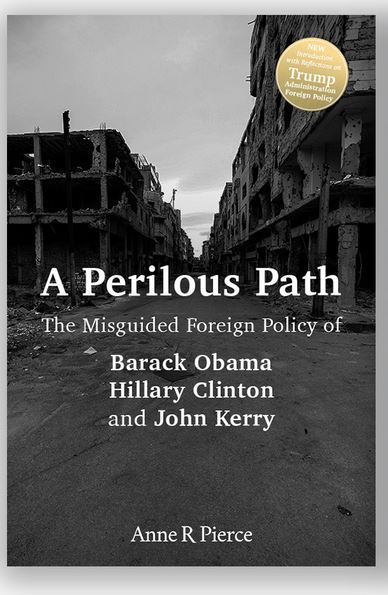Don’t buy that Russia really wants to help the U.S. deal with North Korea.
Russia insists negotiating with North Korea is “the only correct approach” and is offering to help the United States get negotiations started. Look out. Russian “help” in global hotspots usually means trouble.
Russia’s “defensive” military operations in Ukraine (and before that in Chechnya and Georgia); devastating air campaign in support of genocidal Syrian dictator Bashar Assad; cunning use of “ceasefires” and “peace plans” to buy time and regain militarily momentum; savvy use of the war on terror as cover for targeting democracy movements; and use of disinformation to achieve anti-democratic goals should make us wary. So should Russia’s long, close relationship with the brutal, fanatical and hostile North Korean regime.
Although North Korea has repeatedly refused or backed out of negotiations and violated previously negotiated terms, many still advocate a diplomatic solution. The Trump administration’s “maximum pressure” campaign, however, is based on the realization that diplomatic efforts failed to stem the alarming progress of North Korea’s nuclear and missile programs, and that previous sanctions were insufficient and inadequately enforced. Future negotiations were not ruled out, but they were to be contingent upon evident North Korean willingness to discuss eliminating its weapons of mass destruction.
It was a notable departure, then, when Secretary of State Rex Tillerson offered last week to negotiate with North Korea without preconditions other than a “period of quiet.” China and Russia immediately praised the move. Coming from North Korea’s chief protectors and subsidizers, the praise should give us pause.
Through his press secretary, President Donald Trump denied anything has changed in U.S. policy. Tillerson then qualified his offer, asserting at the United Nations that “a sustained cessation of North Korea’s threatening behavior must occur before talks can begin.” Yet, following a conversation with Russian President Vladimir Putin toward the end of his Asia trip, Trump tweeted, “I want to solve North Korea, Syria, Ukraine, terrorism and Russia can greatly help!” It so happens that help in getting the United States and North Korea to the negotiating table is just what Russia proffers.
Russia is positioning itself as arbiter and offering to set up direct talks between North Korea and the United States. Foreign Secretary Sergei Lavrov asserted, “We are ready to promote such talks.” Member of the Russian legislature Vitaly Pashin said North Korea was ready for negotiations with the U.S. “with the participation of Russia as a third party.” Deputy Foreign Minister Igor Morulov said Russia had opened communication channels with North Korea and was prepared to assert influence.
While obvious, it should be emphasized that North Korea, China and Russia all want to subvert U.S. policies. Those policies put real pressure on the three countries and expose their tight connections. In addition to increased U.S. military power and exercises on the Korean peninsula, American leverage comes in the form of tougher U.S. and U.N. sanctions on North Korea and its enablers, and pressure on all countries to freeze North Korean money, cease trade and technology transfers, and disband front companies. Russia insists military drills and tough penalties are only pushing North Korea closer to war and instead of “maximum pressure” calls for “maximum restraint.” Tellingly, however, Russia, recently conducted its own military drills with Japan, suggesting it is not the drills themselves but strong U.S. alliances Russia objects to. China and Russia are intent on expanding geopolitical and military power at the expense of the United States and its allies.
Although Russia and China don’t want North Korea to instigate war, they do want North Korea to remain a formidable communist totalitarian regime that provides a buffer against ever-threatening democracy movements and increases their own clout. Russia consistently sides with China in vetoing or diluting U.N. resolutions that punish North Korea’s horrific human rights violations or nuclear provocations. Chinese and Russian assistance allow the Hermit Kingdom, whose people are severely oppressed and live in dire poverty, to survive.
In the Putin years, Russia has refurbished relations and quietly increased assistance. Already an employer/exploiter of North Korea’s cheap hard labor and one of its biggest food donors, Russia more than doubled trade with North Korea in early 2017, with most trade coming from oil exports. In September, Russia and China did finally agree to limits on oil exports (while refusing an outright ban) in U.N. Resolution 2375. Yet Asia Press International reports that, since then, Russia has actually increased oil exports, thereby helping North Korea avoid the full weight of sanctions. At the same time, a Russian telecommunications company has provided North Korea with a second internet connection, thereby potentially helping it defend nuclear and missile arsenals from cyberattacks.
Experts see signs of Russian technology and handiwork in North Korean weapons. Missile tests last spring coincided with Russia’s launch of a ferry service from Vladivostok to the North Korean port Rajin. Russian smugglers are apparently using the ports to conceal transactions and launder payments. The recently tested intercontinental ballistic missile appeared to be powered by Soviet-made engines and rocket fuel originally manufactured in Russia. Then there are Russia’s recurrent violations of its own nuclear and missile agreements.
Clearly, Russian help with North Korea, let alone ideas Russia finds agreeable, should be met with extreme caution.
This article was originally published at U.S. News & World Report on Dec. 21, 2017. Read the full article here.


